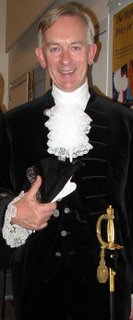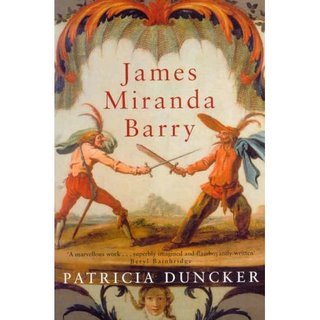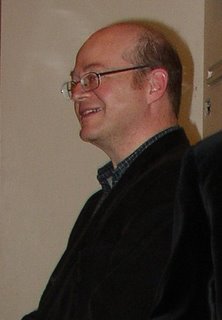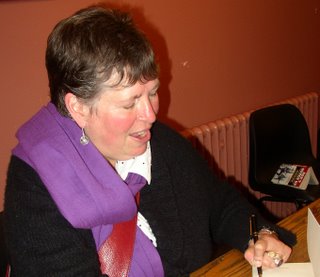Patricia Duncker and the High Sheriff's Prize for Literature.
On Wednesday night the 2006 winner of the High Sheriff of Cheshire's prize for Literature was announced.

The local dignitaries were there including the High Sheriff who initiated the prize and the current High Sheriff - who was a charming man in full attire including a sword which I was fascinated to see was genuine. Also present were the Lord Mayor of Chester, the vice-chancellor of the university, the head of the English department, where I used to work (albeit fleetingly) and the novelist who was presenting the prize - Patricia Duncker.

Patricia Duncker is a highly regarded novelist. In fact when I asked one of my editors for a list of recommended reading one of Patricia Duncker's novels -'James Miranda Barry' appeared in the list of about 25 contemporary books; so I was looking forward very much to what she had to say. She is also professor of writing at the University of East Anglia - which is home to the country's leading MA in creative writing.
 Patricia Duncker approves of prizes and awards. She says they are important in that they give a writer confidence and a sense of achievement. During the reception before the event one of the judges told me that the administrator of the award had made special pains to ensure that the entries were indeed anonymous - the judges would have no idea who had won until the name of the author was read out at the end of the evening. And that is at the very end. Whoever organises the evening must take malicious pleasure in drawing the evening out for as long as possible. First the invited author is introduced, then she gives a talk, then a reading of about fifteen minutes, then the chairman of the judges gives a long summary of that years entry, then the three runners up are announced and then the winning story read out by the guest novelist.
Patricia Duncker approves of prizes and awards. She says they are important in that they give a writer confidence and a sense of achievement. During the reception before the event one of the judges told me that the administrator of the award had made special pains to ensure that the entries were indeed anonymous - the judges would have no idea who had won until the name of the author was read out at the end of the evening. And that is at the very end. Whoever organises the evening must take malicious pleasure in drawing the evening out for as long as possible. First the invited author is introduced, then she gives a talk, then a reading of about fifteen minutes, then the chairman of the judges gives a long summary of that years entry, then the three runners up are announced and then the winning story read out by the guest novelist.
Only at that stage does the winner know he or she has won. Then, after the sheriff has given a speech that must last only for about ten minutes but seems like much longer, the winner's name is read out. Very cruel. This year it was Simon Gotts, someone I have known for years and a member of Chester Writers - pictured below - so I was delighted for him. Another member of the group, Clive McWilliam, was one of the runners up - so an excellent night for Chester Writers.

Pactricia Duncker's talk before her reading was most interesting. Writing, she says, is a risky and difficult thing to do. She says that it is essential in her opinion to be ambitious and to continually aim for something higher. It is bound up with reading. According to Donna Tartt, she says, the only advice she gives to becoming successful is to read. One word: read. But you should not read just anything but you should read something difficult, something you find hard to master and try to master that yourself.
 Patricia Duncker also believes that a study of the history of the form is useful. She herself is an expert on eighteenth and nineteenth century literature.
Patricia Duncker also believes that a study of the history of the form is useful. She herself is an expert on eighteenth and nineteenth century literature.
It is not necessary to have an interesting life. It is much more important to have a mastery of image and language.
She went on to consider the short story. A short story can be anything from one page to 40 pages long but must have enough impact to be read in one sitting. It is unlike a novel, which you carry around with you in your head for days at a time and may not want to end, if you love it.
A short story may contain a firecracker or a depth charge. There is often a shock which may sometimes be gentle but sometimes quite large.
A test for a good short story, Patricia Duncker says, is like the test for a good novel - does it have the 'Lingua Factor' i.e. can it be remembered after reading 15 other novels?
There is sometimes a hostile response to the short story. It is sometimes thought to be not as satisfying as a novel and may be disturbing rather than comforting. The short story is closely related to poetry and dream. There tends to be less memory and history. There are more gaps which are evocative of dreams which the reader must fill in. So many short stories demand an intense relationship with the reader - requiring the reader to engage and make more of an imaginative leap than they would with a novel. It needs to have tension, emotion, change, a good story and a strong evocation of setting. The setting is particularly important she thinks and is related to the 'lingua factor'. You can read one of Patricia Duncker's short stories in the Barcelona Review (a link pointed out to me by Adrian (not the percussionist) Benson).

Writing, Patricia Duncker concluded, is a public performance. It is hard to get right but can be liberating. She spoke enthusiastically of a book she read as an adolescent: 'Thief's Journal' by Jean Ginet. It was, she says confessional, dangerous and daring - which I think looks like some of the words that could describe the two books of Patricia Duncker's that she signed for me after the event: 'Hallucinating Foucault' and 'James Miranda Barry'.
 I am looking forward to reading them soon. They were both first published by Serpent's Tail the successful small press that is also publishing the Fall Anthology 'Perverted by Language' next year. Patricia Duncker is also contributing a piece of flash fiction to one of Pete Wild's other projects - another anthology. In fact Patricia Duncker seems to be quite a friend of the small press and acts as an editor for one of them in Wales. She is a friendly and approachable person and now have to report that on Wednesday night she won my slavish respect for evermore. When I asked her to sign my books she asked me for my name and it turned out that she has read one of my books. She could even remember its name. I was most impressed - and, I have to say, rather stupidly delighted.
I am looking forward to reading them soon. They were both first published by Serpent's Tail the successful small press that is also publishing the Fall Anthology 'Perverted by Language' next year. Patricia Duncker is also contributing a piece of flash fiction to one of Pete Wild's other projects - another anthology. In fact Patricia Duncker seems to be quite a friend of the small press and acts as an editor for one of them in Wales. She is a friendly and approachable person and now have to report that on Wednesday night she won my slavish respect for evermore. When I asked her to sign my books she asked me for my name and it turned out that she has read one of my books. She could even remember its name. I was most impressed - and, I have to say, rather stupidly delighted.
She asked me what I was writing now and I told her about the book that went into the publishers five weeks ago and how I was still waiting to hear with not an enormous amount of confidence or optimism - and explained why.
'Ah, mid-lists...' she said, and shook her head.

The local dignitaries were there including the High Sheriff who initiated the prize and the current High Sheriff - who was a charming man in full attire including a sword which I was fascinated to see was genuine. Also present were the Lord Mayor of Chester, the vice-chancellor of the university, the head of the English department, where I used to work (albeit fleetingly) and the novelist who was presenting the prize - Patricia Duncker.

Patricia Duncker is a highly regarded novelist. In fact when I asked one of my editors for a list of recommended reading one of Patricia Duncker's novels -'James Miranda Barry' appeared in the list of about 25 contemporary books; so I was looking forward very much to what she had to say. She is also professor of writing at the University of East Anglia - which is home to the country's leading MA in creative writing.
 Patricia Duncker approves of prizes and awards. She says they are important in that they give a writer confidence and a sense of achievement. During the reception before the event one of the judges told me that the administrator of the award had made special pains to ensure that the entries were indeed anonymous - the judges would have no idea who had won until the name of the author was read out at the end of the evening. And that is at the very end. Whoever organises the evening must take malicious pleasure in drawing the evening out for as long as possible. First the invited author is introduced, then she gives a talk, then a reading of about fifteen minutes, then the chairman of the judges gives a long summary of that years entry, then the three runners up are announced and then the winning story read out by the guest novelist.
Patricia Duncker approves of prizes and awards. She says they are important in that they give a writer confidence and a sense of achievement. During the reception before the event one of the judges told me that the administrator of the award had made special pains to ensure that the entries were indeed anonymous - the judges would have no idea who had won until the name of the author was read out at the end of the evening. And that is at the very end. Whoever organises the evening must take malicious pleasure in drawing the evening out for as long as possible. First the invited author is introduced, then she gives a talk, then a reading of about fifteen minutes, then the chairman of the judges gives a long summary of that years entry, then the three runners up are announced and then the winning story read out by the guest novelist.Only at that stage does the winner know he or she has won. Then, after the sheriff has given a speech that must last only for about ten minutes but seems like much longer, the winner's name is read out. Very cruel. This year it was Simon Gotts, someone I have known for years and a member of Chester Writers - pictured below - so I was delighted for him. Another member of the group, Clive McWilliam, was one of the runners up - so an excellent night for Chester Writers.

Pactricia Duncker's talk before her reading was most interesting. Writing, she says, is a risky and difficult thing to do. She says that it is essential in her opinion to be ambitious and to continually aim for something higher. It is bound up with reading. According to Donna Tartt, she says, the only advice she gives to becoming successful is to read. One word: read. But you should not read just anything but you should read something difficult, something you find hard to master and try to master that yourself.
 Patricia Duncker also believes that a study of the history of the form is useful. She herself is an expert on eighteenth and nineteenth century literature.
Patricia Duncker also believes that a study of the history of the form is useful. She herself is an expert on eighteenth and nineteenth century literature.It is not necessary to have an interesting life. It is much more important to have a mastery of image and language.
She went on to consider the short story. A short story can be anything from one page to 40 pages long but must have enough impact to be read in one sitting. It is unlike a novel, which you carry around with you in your head for days at a time and may not want to end, if you love it.
A short story may contain a firecracker or a depth charge. There is often a shock which may sometimes be gentle but sometimes quite large.
A test for a good short story, Patricia Duncker says, is like the test for a good novel - does it have the 'Lingua Factor' i.e. can it be remembered after reading 15 other novels?
There is sometimes a hostile response to the short story. It is sometimes thought to be not as satisfying as a novel and may be disturbing rather than comforting. The short story is closely related to poetry and dream. There tends to be less memory and history. There are more gaps which are evocative of dreams which the reader must fill in. So many short stories demand an intense relationship with the reader - requiring the reader to engage and make more of an imaginative leap than they would with a novel. It needs to have tension, emotion, change, a good story and a strong evocation of setting. The setting is particularly important she thinks and is related to the 'lingua factor'. You can read one of Patricia Duncker's short stories in the Barcelona Review (a link pointed out to me by Adrian (not the percussionist) Benson).

Writing, Patricia Duncker concluded, is a public performance. It is hard to get right but can be liberating. She spoke enthusiastically of a book she read as an adolescent: 'Thief's Journal' by Jean Ginet. It was, she says confessional, dangerous and daring - which I think looks like some of the words that could describe the two books of Patricia Duncker's that she signed for me after the event: 'Hallucinating Foucault' and 'James Miranda Barry'.
 I am looking forward to reading them soon. They were both first published by Serpent's Tail the successful small press that is also publishing the Fall Anthology 'Perverted by Language' next year. Patricia Duncker is also contributing a piece of flash fiction to one of Pete Wild's other projects - another anthology. In fact Patricia Duncker seems to be quite a friend of the small press and acts as an editor for one of them in Wales. She is a friendly and approachable person and now have to report that on Wednesday night she won my slavish respect for evermore. When I asked her to sign my books she asked me for my name and it turned out that she has read one of my books. She could even remember its name. I was most impressed - and, I have to say, rather stupidly delighted.
I am looking forward to reading them soon. They were both first published by Serpent's Tail the successful small press that is also publishing the Fall Anthology 'Perverted by Language' next year. Patricia Duncker is also contributing a piece of flash fiction to one of Pete Wild's other projects - another anthology. In fact Patricia Duncker seems to be quite a friend of the small press and acts as an editor for one of them in Wales. She is a friendly and approachable person and now have to report that on Wednesday night she won my slavish respect for evermore. When I asked her to sign my books she asked me for my name and it turned out that she has read one of my books. She could even remember its name. I was most impressed - and, I have to say, rather stupidly delighted.She asked me what I was writing now and I told her about the book that went into the publishers five weeks ago and how I was still waiting to hear with not an enormous amount of confidence or optimism - and explained why.
'Ah, mid-lists...' she said, and shook her head.
3 Comments:
Delighted by Simon's success. Good News.
Chester seems such a warm place for writers... You live in a decent-sized place with lots of events in a relatively small country. It all seems nest-like but big enough to be interesting.
(Of course, I am now wondering why I live in a tiny village in a gigantic country. That translates into being in a place with few other writers, inside a larger place where one is a needle in a haystack.)
Plus you have that charming High Sheriff in his beauteous regalia.
Yes, Marly I think we're lucky...but just sometimes when I'm in a plane looking down this island seems so crowded. Every bit of space is used. It is almost impossible to go anywhere and feel entirely alone.
But the sheriffs are very nice!
Post a Comment
Comments are subject to moderation.
<< Home